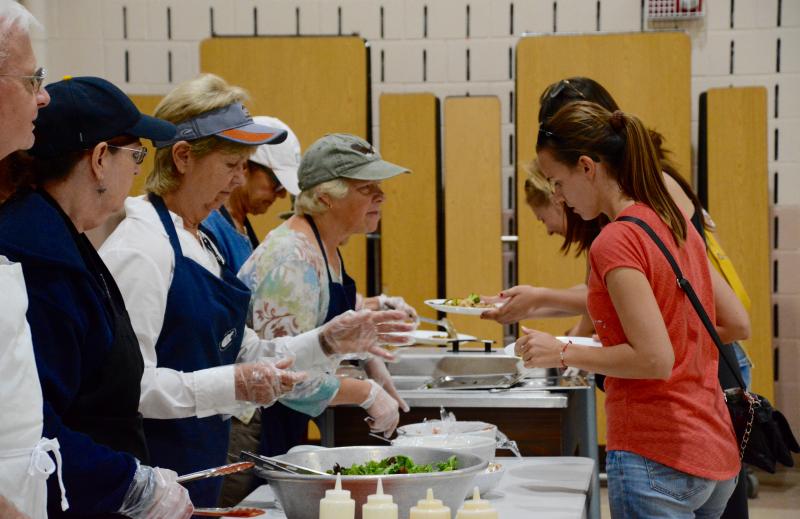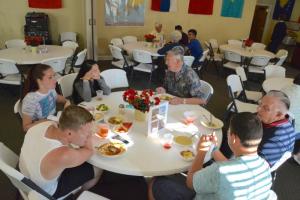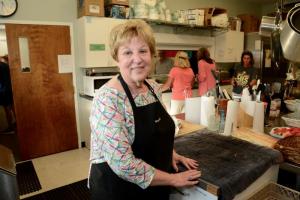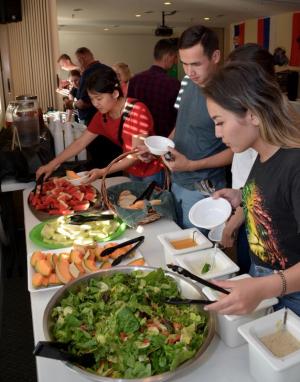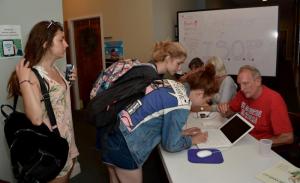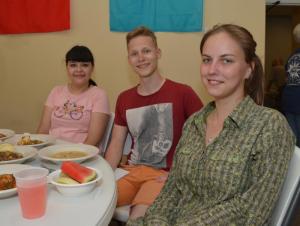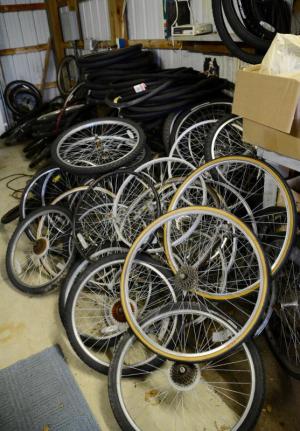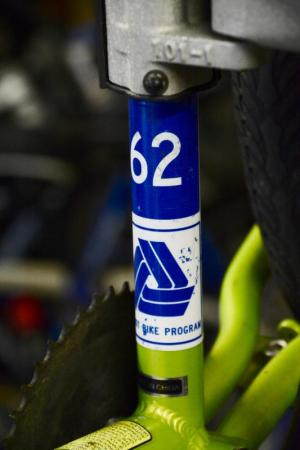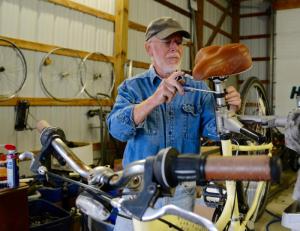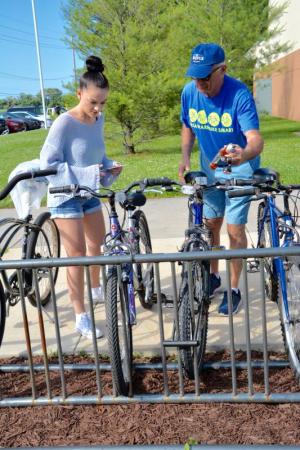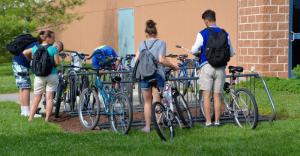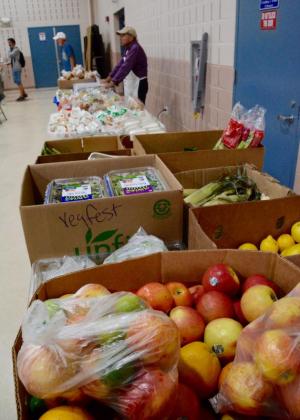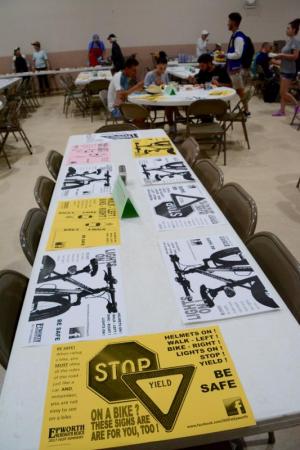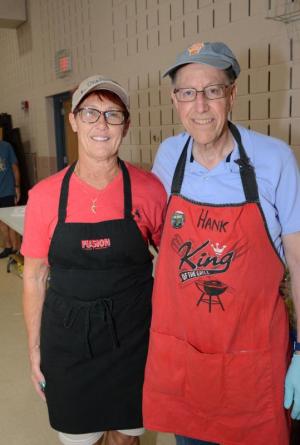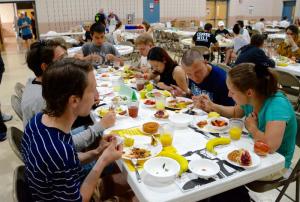Dozens of volunteers are quietly working behind the scenes to help international students in the Cape Region.
The International Student Outreach Program has been sponsored by the Lewes-Rehoboth Association of Churches for more than 15 years. This year about 1,000 international students are working in the Cape Region.
Students come to the Cape Region with a J1 visa under a U.S. Department of State summer work-travel program. As many as 300,000 students come to the United States each year under the program.
Four churches host weekly free dinners for the students: New Covenant Presbyterian Church in Lewes on Mondays; and in Rehoboth Beach, Epworth United Methodist Church on Tuesdays; St. Edmond's Catholic Church on Wednesdays; and Lutheran Church of Our Savior on Thursdays.
And while students get a home-cooked meal, they also have time to interact socially with fellow students and church members.
“We want them to feel at home and hear the word of God,” said Kit Kennedy at Church of Our Savior. “They get a chance to practice their English and also to socialize.”
Most students work in the program from just before Memorial Day to just after Labor Day, yet they could have another few weeks left on their visa. “Some schedule trips around the U.S. before they leave,” Kennedy said.
The ISOP program provides trips at a nominal cost for the students, usually to Philadelphia and Washington, D.C.
Kennedy said many of the students have trouble understanding that ISOP is a program run by volunteers. “They think it has to be a government program,” he said.
Students end up with several jobs
ISOP Director Maryann Kaufmann said students pay a lot to get here – as much as $2,000 to $3,000, plus airfare and housing costs once they arrive. Each student must register with and pay a sponsor and pay registration and application fees. The process also includes an interview at the U.S. Embassy in their home country before a temporary visa can be issued.
“That's why they work two or three jobs. You see them out on their bikes in the rain and at night because they have to work,” she said. “They have become a critical part of our economy.”
Contrary to what most think, Kauffman said, the program is not a jobs program but a diplomacy tool under the auspices of the U.S. State Department. “They want the students to have a good experience and share that with others when they return home,” she said.
Students in the J1 visa program must be full-time college students, have health insurance and competency in English. “There are MBA and law students out there serving ice cream and making beds,” she said.
Getting around area on two wheels
Many of the students use bicycles as their only source of transportation to and from work, and many ride several miles, and usually along Route 1. This year, the program will distribute about 160 bikes in clusters of 20 to 25 during six to eight distribution events, which include safety classes. “We try to have the class within a few days of their arrival,” said program coordinator Bruce Kaufmann.
The bike program has come a long way. Currently, there are about 350 bikes in storage ready for distribution, he said.
Kaufmann said when he first got involved with the program fixing flat tires was about the extent of what was offered. The program started with one bike.
Through donations, over the past few years volunteers have assembled a large stock of bikes and parts have been assembled.
Two years ago, the bike program got a major boost when DelDOT donated a building at the Rehoboth Beach Park and Ride off Shuttle Road to work on and store bicycles. The program also uses two storage sheds at the park and ride as well as sheds at Epworth and the Lutheran churches to store bikes.
Each bike is identified with a decal and number that is entered into a database. Included on the decal is an email address so at the end of summer students can alert ISOP volunteers where they are leaving the bike and bike lock's combination.
Previously, students were asked to return the bikes to one of the four churches. “They have too much to worry about when they leave, and we weren't getting a lot of bikes back. Now, we have a decent return rate,” Kaufmann said.
When the bikes are returned, they are overhauled or repaired and put back into storage for the next season. Kaufmann, a cyclist and self-taught bike mechanic, said volunteers continue to work on bikes in the fall and even into the winter until it gets too cold in the bike shop.
ISOP volunteers are doing everything in their power to keep students safe. The program offers free refurbished bicycles, but only to those who take a safe-riding class and pass a riding test. Those take place during weekly dinners at the churches.
Once students receive their bicycles – which they reserve before they arrive – volunteers also offer free repairs at the park-and-ride bike barn.
Kaufmann was so passionate about the program, up until two years ago, he took the bike repair shop to the students. His van was filled with spare parts, and he would respond to a work place or apartment. He said it was a challenge fighting traffic and finding parking during the busy summer season.
“Our goal is to have enough bikes available for the six to eight distribution events,” he said.
That's when students select a bike and take a safety class. Helmets are available to those who say they will wear them, but most don't, he said.
The safety training class has become an important outreach of the program. “It's a lot about riding on Coastal Highway,” Kaufmann said. “I explain how I ride on Route 1 and teach them about the problem spots.”
The class is followed with a bike skills course. “We want to make sure the students are comfortable with riding their particular bike,” he said.
DelDOT, Sussex Cyclists and other volunteers provide safety checkpoints at the church dinners as well as along Route 1 throughout the summer. “Every one is so patient here. In Romania, everyone is in a rush,” said Andra Lupascu, as she waited to get a light placed on her bike during a recent checkpoint.
Epworth has food-rescue program
Epworth is the hot spot for the program serving 2,800 meals in 2017 and amassing 3,800 volunteer hours in the process. Volunteers from the Seaside Jewish Community also help at the church.
What makes Epworth unique is its food-rescue program, used for ISOP as well as its weekly soup kitchen. In 2017, a dedicated team of 13 volunteers reclaimed nearly 45,000 pounds of food that would have ended up in the garbage.
Wawa subs, bread from Panera, Starbucks desserts, fruits and vegetables from stores such as Fresh Market, Giant and Grub Hub, treats from TCBY and much, much more are used in food preparation and for students to take home.
Using rescued food, Epworth has been able to cut down its meal cost to $2 a person during its weekly ISOP dinner.
Hank Smith, one of the coordinators, said as strong as the program is, it could be better with more participation from local markets. “Some are afraid of litigation, but there is a law to protect them,” Smith said.
The 1996 Good Samaritan Donation Act protects good-faith food donors from civil and criminal liability should the product cause harm. Included on the long list of those falling under the law are individuals, wholesalers, retailers, restaurateurs, caterers, farmers and nonprofits.
Twice a week, the team travels out gathering food at local stores. Food they don't use is donated to a nearby dairy farmer.
IN 2017
960 students
781 worked in Rehoboth; 131 in Dewey; 48 in Lewes
Top four countries: Romania; Russia; Serbia; Kazakhstan
Dinners served: 5,500











